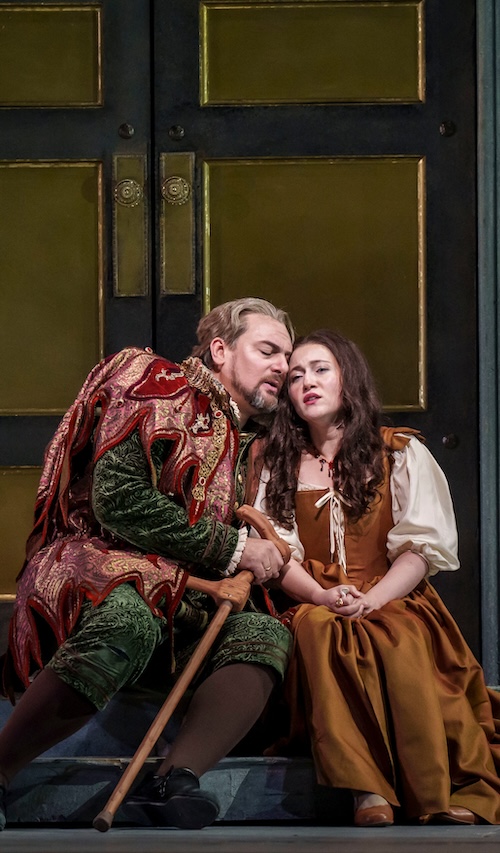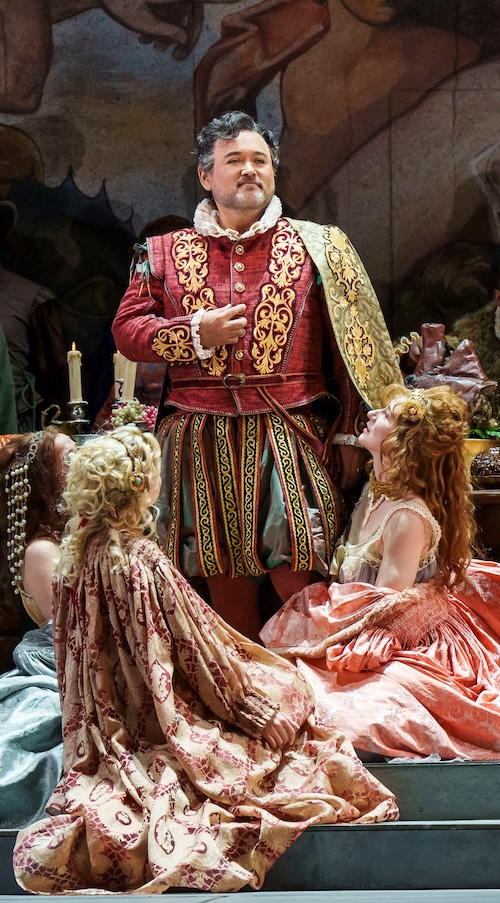Stellar cast shines as Lyric Opera opens season with a near-great “Rigoletto”

Lyric Opera opened its 70th season Saturday night at a transition point for the company. Anthony Freud has departed and while his successor John Mangum was in the house, he will not officially take the reins as Lyric’s CEO until October 14. The recorded welcome announcement was done by Mané Galoyan, the evening’s Gilda.
With fresh administrative winds wafting through the Civic Opera House, the performance of Verdi’s Rigoletto on a warm late-summer evening seemed to reflect a new sense of cautious optimism—one voiced by longtime patrons in the lobby. Saturday’s season opener at times seemed to be on the verge of presenting a truly great and memorable Rigoletto.
Unfortunately—and yet again—two intrusive directorial idiocies late in the evening prevented a complete success. Neither was fatal but they were damaging enough to undermine the climax of the opera and dissipate the cumulative buildup of tension over the preceding two hours.
Rigoletto remains one of the bleakest operas in the regular repertory (paradoxically with some of Verdi’s most cheerful and lilting arias). The court of 15th-century Mantua is a barren dystopian landscape where corruption is omnipresent, rape and abduction are sport, murder a negotiable commodity, and the innocent must be sheltered at home away from the dangerous streets. Not unlike present-day Chicago.
Yet a stellar trio of principals provided the requisite vocal gleam to illuminate the compensating rays of humanity in Verdi’s dark Melodramma in tre atti.
Two seasons ago Igor Golovatenko made a lackluster Lyric debut as Rodrigue in the company’s disappointing Don Carlos. Happily—and somewhat surprisingly—the Russian baritone seemed better suited to the title role of Rigoletto, the embittered and vindictive court jester whose only soft spot is for his daughter, Gilda.
While his timbre may not be very Italianate, Golovatenko largely provided the requisite vocal power and dramatic impact. In his “Cortigiani,” he delivered a thunderous denunciation of the courtiers who abducted Gilda and was equally affecting in his desperate pleading for her return. The baritone blended graciously with Galoyan’s soprano and brought tender sensitivity to their Act 2 duet and the tragic final scene. If Golovatenko didn’t fully explore the emotional range and complexity of the tormented jester—and his limp seemed to come and go—he hit most of the crucial dramatic grace notes as needed.
It’s unfortunate timing for the gifted Mané Galoyan that she follows Rosa Feola, who delivered the Gilda of one’s lifetime at Lyric’s last Rigoletto seven seasons ago.
Still, the rising Armenian soprano largely lived up to her advance notices in her company debut, displaying a graceful, flexible voice with a hint of steel in the upper range. Galoyan brought a natural, physical grace to the innocent girl who is in love with the raffish Duke of Mantua, even after his betrayal of her misplaced affections.
Oddly, Galoyan’s “Caro nome” was surprisingly routine opening night—gracefully sung and accurate yet cautious in the coloratura flights and stinting on high notes in the cadenza. While the aria was nicely rendered, this was not even close to the rapt, time-stopping experience that Feola gave Lyric audiences in 2017.

Also making his Lyric bow was Javier Camarena in the role of the charismatic, philandering Duke. A regular star at the Met and on other international stages, the Mexican tenor’s high, agile voice remains in impressive repair eight years after he made a rousing Chicago debut in a concert at the Harris Theater.
Vocally this was about as well sung a performance of this challenging role as one will ever hear. Camarena showed easy flexibility in “La donna è mobile” (with a nice interpolated yawn for the sleepy Duke), was duly impassioned in “Parmi veder le lagrime,” and ardent in his duetted moments with Galoyan’s Gilda. Camarena’s Duke was a more conflicted presence than usual, genuinely concerned about Gilda’s welfare while still unwilling to change his horn-dog ways.
Three strong principals should have made for a wholly successful Rigoletto alone, yet they were undermined by bizarre and intrusive stage conceits by debuting director Mary Birnbaum.
It’s invariably an ominous sign when a director feels the need to devise a theatrical pantomime over the Prelude or Overture. Birnbaum has Gilda reading her hidden letters from the Duke while she is watched over by the golden spirit of her dead mother, complete with massive angel wings. All of which added nothing and only served to detract from the stark malign power of Verdi’s mood-setting instrumental opening.
After that Birnbaum’s direction was largely inoffensive for the first two acts, though crowd scenes were awkwardly handled, with the courtiers capering about oddly.
Unfortunately, the director saved her worst ideas for the climax of the opera. Rather than the sudden blackout Verdi requests when the self-sacrificing Gilda enters Sparafucile’s den to her doom, Birnbaum has the character engage in an extended sword fight with the veteran assassin (and, incredibly, has the slumbering Duke suddenly awaken and join in).
Right. The innocent, naive and cloistered Gilda is instantaneously transformed into a master swordsman like Brienne of Tarth.
Birnbaum saves her second-worst conceit for the opera’s final moments when the dying Gilda suddenly arises and walks offstage with bewinged Angel Mom leaving Rigoletto to his grief alone The sisterhood is all, even when it means inserting this kind of preposterous sentimental treacle.
At least the scenic production was traditional. Robert Innes Hopkins’ rotating set is starting to show its age but still proved atmospheric and effective in its monastic minimalism, aided by Jane Greenwood’s period costumes and Duane Schuler’s painterly lighting.
Soloman Howard provided the apt subterranean bass voice and malign persona as the assassin Sparafucile. Zoie Reams delivered calculating sex appeal and dusky mezzo tone as his temptress sister Maddalena.
Andrew Manea was a Monterone who meant business, delivering an authoritative curse upon Rigoletto that seals the jester’s fate. An array of new Ryan Center artists took on comprimario roles with variable success. The men of the Lyric Opera Chorus brought more volume than clarity to their singing opening night.
Enrique Mazzola served up the requisite dramatic cut and lyric splendor in this most tune-packed of Verdi operas, occasionally jumping the gun on fortissimos and burying the singers. While the opera’s drama was largely well served under the company’s music director, Verdi’s compensating elegance and delicacy were less manifest with dynamics rarely below mezzoforte.
Rigoletto runs through October 6. lyricopera.org
Posted in Performances



Posted Sep 16, 2024 at 3:32 pm by GCMP
“The recorded welcome announcement was done by Mané Galoyan, the evening’s Gilda.” Nice as it was to hear her, and her English is quite good, can anyone imagine a diva of the past doing housekeeping messages? (language aside)?
Posted Sep 24, 2024 at 11:02 am by Wilmette Boxer
A very fine and comprehensive review. I agree that Camarena was too empathetic. I thought that the director was taking some edge off him in order to give it to Gilda, quite literally, as you so aptly point out, in that astounding sword fight, which undercut what the music and text tell us about who she is. Gilda as martial artist?
Something different, anyway, as my mother would have said.
Posted Sep 25, 2024 at 11:40 pm by Alexander
Just can’t help to add my two cents.
Attended 9/25 evening. Mr Golovatenko is undeniably the star of the show. I know the opera by heart; listened to every single prominent Rigolettos, I never expected to be emotionally moved by Cortigiani! He did it to me. Puntatura A flat was great, too.
Ms Galoyan had issues in Caro nome and duetto with Mr Camerena (as did he). But there was true chemistry between the father and daughter – these duets were spellbinding. Mr Camarena made a couple of boo-boos in Parmi veder, but the way he negotiated the murderous phrases completely in passagio range culminating in a high A flat – I forgave him all.
Scenic business – you said it all in the main article. If Ms Director would be less preoccupied with winged mothers and more with her protagonists that would do good for everyone. Otherwise the soloists seem to be left to their own devices as far as physical interpretation goes.
Sets were great, light superb; loved the rotating stage. Impressive color scheme on courtiers’ costumes. All in all I had a Verdi experience.